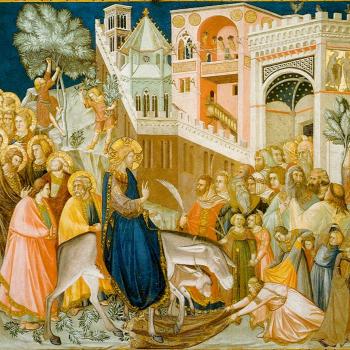Jesus warned us that merely declaring him to be Lord with our lips will not save us: we must acknowledge him in and through our whole being, following him wherever he shall lead. “Not every one who says to me, `Lord, Lord,’ shall enter the kingdom of heaven, but he who does the will of my Father who is in heaven” (Matt. 7:21 RSV). Yes, it is true, that those who proclaim him Lord should be saved, but that is true for everyone. God desires that all should be saved. “This is good, and it is acceptable in the sight of God our Savior, who desires all men to be saved and to come to the knowledge of the truth” (1Tim 2:3-4 RSV). And yet, thanks to our sins, thanks to those actions which we do that turn us away from God, it is quite possible that we might proclaim Jesus as Lord one day, and betray him like the crowd in Jerusalem soon after. What shall happen to us after that?
Acknowledging Jesus as Lord in word is a good foundation. By saying it, we put the thought in our mind, and hopefully we will work out the implications of what it means for Jesus to be Lord, and actually follow him and do as he would wish. But if we don’t, if we just end up constantly proclaiming him Lord on our lips but do not follow him as Lord in deed, what have we truly gained? Paul knew that it was not just belief, but fidelity, which saved, and so he said he could preach salvation and help others obtain it, but if he didn’t obey Christ, he could still be lost. He had to work out his own salvation with fear and trembling (cf. Philippians 2:12) by following Christ, by running the race of life to the very end, putting himself and his sinful inclinations in check in order to receive the reward of salvation:
Do you not know that in a race all the runners compete, but only one receives the prize? So run that you may obtain it. Every athlete exercises self-control in all things. They do it to receive a perishable wreath, but we an imperishable. Well, I do not run aimlessly, I do not box as one beating the air; but I pommel my body and subdue it, lest after preaching to others I myself should be disqualified (1Cor. 9:24-27 RSV).
![By Mykola Swarnyk (Own work) [CC BY-SA 3.0 (http://creativecommons.org/licenses/by-sa/3.0)], via Wikimedia Commons](https://wp-media.patheos.com/blogs/sites/637/2016/03/Rutkovych_Skvariava_Nova_Iconostasis_Entry_into_Jerusalem_LNM-244x300.jpg)
If we believe that there are no expectations placed upon us for salvation other than to say, “I want to be saved,” and proclaim Jesus as Savior, the King of Kings and Lord of Lords, it is no wonder many will join the crowd in his praise. There seems to be everything to gain and nothing to lose. It would seem as if we are not asked to do anything. And so we join in with the crowd, praising Jesus with them so long as it is convenient. And, with the way people act and react, joining in with the crowd means the crowd is also likely to join in with us, if we find ourselves up in front, praising Jesus the loudest – we can, as it were, lead them in the praise, and so lead them to where we would want them to be, praising Jesus with their lips while following us.
It is one thing to proclaim Jesus as Lord, and it is another thing to truly let him be the Lord our life. Salvation is had from fidelity to Jesus, by following him in love. “He who has my commandments and keeps them, he it is who loves me; and he who loves me will be loved by my Father, and I will love him and manifest myself to him” (John 14:21 RSV). Love makes us follow Jesus, and it is in and through such love we will be united with him. It is only by joining him through the bond of love can we be saved. For it is by the way we act, by the way we follow him, by the way we love, which shows to and to the world whether or not we truly know him:
And by this we may be sure that we know him, if we keep his commandments. He who says “I know him” but disobeys his commandments is a liar, and the truth is not in him; but whoever keeps his word, in him truly love for God is perfected. By this we may be sure that we are in him: he who says he abides in him ought to walk in the same way in which he walked (1John 2:3-6 RSV).
To walk in love, to follow Christ in love, is to know God, for God is love, and those who obey the dictates of love know God, while those who counter those dictates and act contrary to God and his love show themselves turned away from God and following the path which leads to perdition. It is not that they will necessarily perish, for God in his love is at work even for them, seeking to reconcile them and the whole world to himself out of his love. o long as they live they have a chance to turn back to Jesus, for he, after all, came to save the world and not condemn it (cf. John 3:17). Nonetheless, those who turn away from God and close themselves to God and his path of love shall receive that which they make for themselves: if they turn away from love, they turn towards the dark, bitterness of hate, and that hate shall surround them and will have no place to go against turned inward against themselves. Hell can be said to be formed out of such hate. It starts out to be against others, but in the end, we do not become what we want, we do not possess what we want and so we end up hating our very being, and hating it throughout eternity. The pain of hell is the pain we create for ourselves out of such self-hatred. And proclaiming Jesus is Lord, but not opening up to him in love, means such words are said in vain and will be judged accordingly.[1]
Thus, as we come to celebrate once again Jesus’ Entry into Jerusalem, Palm Sunday, we must consider how we find ourselves joining in with the crowd, praising Jesus. Do we do so just to fit in, and find ourselves turning against Jesus when the crowd also turns against him, or do we follow him all the way to hell, if necessary, without turning our backs on him and his love? Our whole life is, in some fashion, a perpetuation of Palm Sunday; every day we find ourselves asked to participate in the event and to decide whether or not we will truly follow Jesus with love or if we will follow the crowd and turn against him when our selfish wants and desires are not fulfilled.
Yes, we do find in the crowd many who truly loved Jesus, who praised Jesus with open hearts. Not everyone in the crowd was disingenuous. There were many who came to honestly proclaim him to be the messianic king, and they were guided by the Holy Spirit to do so, in order to show Jesus truly was king. “Those who were childlike in innocence but not in intelligence were inspired by the Holy Spirit to offer up to the Lord a faultlessly perfect hymn, and bore witness that, as God, He had brought Lazarus back to life after he had been dead for four days.” [2] Jesus came as Lord, and showed his Lordship over the hearts of many, of those who had allowed him to conquer their hardened hearts. And so, in his entrance into Jerusalem, their voices were heard, and his true status as Lord was made known:
The Lord desired to manifest Himself as King prior to His voluntary Passion; and it was in fulfillment of this desire that He accomplished His royal entry, not as a violent conqueror but as the victor over death, the meek King, offering salvation and conquering hearts, beloved and reigning by the power of love.[3]
It is for this reason, though he came into Jerusalem as Lord, he did so in a very meek and lowly fashion. His triumph was not like those made in Rome, which honored earthly power and might, but rather his triumph had him come in such a way to honor true power, the power of love:
Behold, then, thy King, coming to you for your benefit; meet, that he may be loved rather than feared for his power; sitting upon an ass. Zechariah calls him, Just and saviour, poor and riding upon an ass. There are two proper virtues for a king, justice and piety. Your king is just, in respect to justice, rendering to each according to his works. He is meek, and a redeemer, with respect to piety. He is poor, as the Apostle says in today’s Epistle:
He emptied himself, taking the form of a servant. [Phil 2.7][4]
While Jesus’ entry into Jerusalem was the historical declaration of his kingship, he proved himself to be Lord, not by force or might, but by taking on the cross and showing his love for all. It was his fulfillment of love which proved he was worthy of love, that he was king not just by might, but by right:
Without love every virtue is tasteless, fruitless, and totally without merit. As he hung on the cross, Christ pressed love out of his hands, feet, and side for us; even on the Mount, when he was in agony and given to lengthy prayer, drops of blood flowed out of his mostly holy body. Christ pressed out, as it were, the oil of gladness, by which he was anointed beyond his companions. [5]
Indeed, he could be said to be the true Ulysses, putting himself on the cross, allowing himself to be held there in order to redirect the world and the people in it, so that they can sail past the passions which lead to perdition and instead find salvation:
If, then, the story says of Ulysses that having been bound to the mast saved him from danger, how much more ought there to be preached what really happened – namely, that today the tree of the cross has snatched the whole human race from the danger of death![6]
But, as we have seen, to be rescued by Christ, we must follow him on the path of love. He has given to us an example of what we must do. We must bind ourselves to the cross, die to the self so as to overcome the selfishness which leads to hate, if we would live in and through Christ’s love:
For a ship’s mast is like the cross of the Church which alone, in the midst of the charming and destructive traps of the whole world, is safe to cling to. On this ship, then, whoever binds himself to the tree of the cross or stops his ears with the divine Scriptures will not fear the sweet tempest of wantonness. For the alluring manner of the Siren is a kind of enervating desire for pleasures, which weakens the steadfastness of the captive mind and its evil blandishments.[7]
We must, therefore, turn to Christ in true love, and follow him in meekness and justice if we are to be saved. While we live, we are constantly being questioned as to who we say Christ is. We can easily proclaim him as Lord, but not truly know him, and find ourselves perishing because we denied his commands. We can be like those who shouted Jesus is Lord, the King of Kings while denying him with their hearts. We can go from “Jesus is Lord” to “crucify him,” not by words, but by deeds, as we find a way to take some earthly power for ourselves and use it to trample on everyone else. Indeed, we can even use the semblance of being his servant as a means of hiding our animosity and hate and so appear to be one thing while acting and doing the opposite. Just because we proclaim with our lips Jesus is Lord does not mean we believe it with our hearts and follow through with the ramifications of his Lordship. We are called to follow him, to be meek and humble, and only then do we show him to be the Lord of our hearts and the savior of our souls. “By this all men will know that you are my disciples, if you have love for one another” (John 13:35 RSV). We show him to be Lord not by what we proclaim with our mouth with words which we can use to deceive others but by how we follow Jesus in the path of love.
Palm Sunday therefore represents the two ways Jesus can be proclaimed as Lord. There are those who truly follow him in love and are enlightened by the Spirit, and so proclaim Jesus is Lord in their hearts. “Therefore I want you to understand that no one speaking by the Spirit of God ever says ‘Jesus be cursed!’ and no one can say ‘Jesus is Lord’’ except by the Holy Spirit” (1Cor. 12:3 RSV). To say Jesus is Lord is not to be seen as a verbal declaration but a proclamation of our whole being, a declaration of love for Jesus which seeks to follow and imitate him in acts of love. Only those who follow true love know Jesus, and by acting out such love, they show with their deeds that Jesus is indeed their Lord. On the other hand, there are those who, seeking glory, seeking fame or what they can get from others by such an act, say Jesus is Lord on their lips. And yet, it is all external, and they will be the first to act against Jesus and deny him and seek his end when they do not get what they want. Let us not be found amongst them nor deceived by those who proclaim Jesus in this fashion, for it is this false declaration which opens us up to the ways of the anti-Christ and risks the eternal pain in death which the path of hate brings.
Let us therefore ponder, each and every day, what we mean when we say Jesus is Lord. Is Jesus truly our Lord because we love him, or do we follow the crowd and turn against him when following him turns out to be inconvenient? Do we proclaim him with our hearts and deeds or do we just do so with our lips, and turn our backs against him in our very deed? Which is it?
[1] “I tell you, on the day of judgment men will render account for every careless word they utter; for by your words you will be justified, and by your words you will be condemned” (Matt. 12:36-7 RSV).
[2] St. Gregory Palamas, “On Palm Sunday” in Saint Gregory Palamas: The Homilies. trans. Christopher Veniamin and the Monastery of St. John the Baptist Essex, England (Waymart, PA: Mount Thabor Publishing, 2009), 113.
[3] Sergius Bulgakov, Churchly Joy. trans. Boris Jakim (Grand Rapids, MI: William B Eerdman’s Publishing Company, 2008), 102.
[4] St. Anthony of Padua, Sermons for Sundays and Festivals. Volume 1. trans. Paul Spilsbury (Padua: Aedizioni Messaggero Padova, 2007),218.
[5] Achard of Saint Victor, “On [the Sunday of] Palm Branches,” in Works. trans. Hugh Feiss, OSB (Kalamazoo, MI: Cistercian Publications, 2001), 142-3.
[6] St. Maximus of Turin, The Sermons of St. Maximus of Turin. trans. Boniface Ramsey, O.P. (New York: Newman Press, 1989), 90.
[7] St. Maximus of Turin, The Sermons of St. Maximus of Turin, 90.
Stay in touch! Like A Little Bit of Nothing on Facebook:
A Little Bit of Nothing













